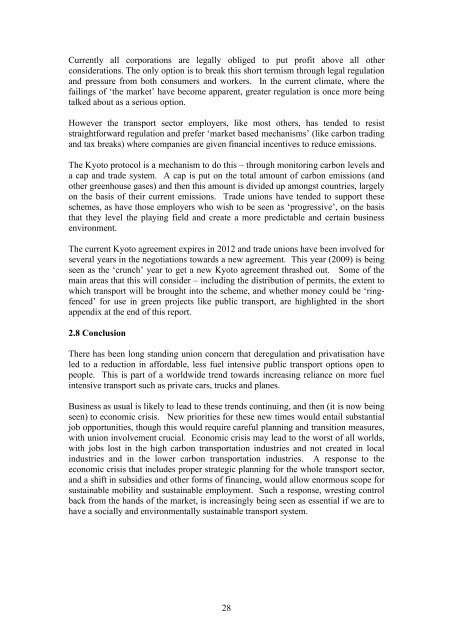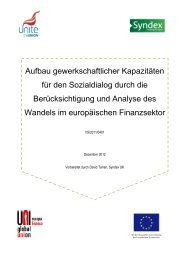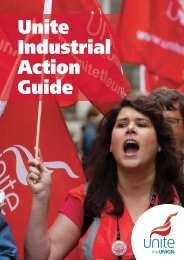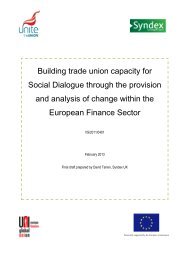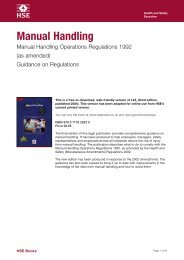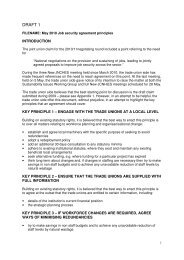Sustainable Transport and the Environment Guide - Unite the Union
Sustainable Transport and the Environment Guide - Unite the Union
Sustainable Transport and the Environment Guide - Unite the Union
Create successful ePaper yourself
Turn your PDF publications into a flip-book with our unique Google optimized e-Paper software.
Currently all corporations are legally obliged to put profit above all o<strong>the</strong>r<br />
considerations. The only option is to break this short termism through legal regulation<br />
<strong>and</strong> pressure from both consumers <strong>and</strong> workers. In <strong>the</strong> current climate, where <strong>the</strong><br />
failings of ‘<strong>the</strong> market’ have become apparent, greater regulation is once more being<br />
talked about as a serious option.<br />
However <strong>the</strong> transport sector employers, like most o<strong>the</strong>rs, has tended to resist<br />
straightforward regulation <strong>and</strong> prefer ‘market based mechanisms’ (like carbon trading<br />
<strong>and</strong> tax breaks) where companies are given financial incentives to reduce emissions.<br />
The Kyoto protocol is a mechanism to do this – through monitoring carbon levels <strong>and</strong><br />
a cap <strong>and</strong> trade system. A cap is put on <strong>the</strong> total amount of carbon emissions (<strong>and</strong><br />
o<strong>the</strong>r greenhouse gases) <strong>and</strong> <strong>the</strong>n this amount is divided up amongst countries, largely<br />
on <strong>the</strong> basis of <strong>the</strong>ir current emissions. Trade unions have tended to support <strong>the</strong>se<br />
schemes, as have those employers who wish to be seen as ‘progressive’, on <strong>the</strong> basis<br />
that <strong>the</strong>y level <strong>the</strong> playing field <strong>and</strong> create a more predictable <strong>and</strong> certain business<br />
environment.<br />
The current Kyoto agreement expires in 2012 <strong>and</strong> trade unions have been involved for<br />
several years in <strong>the</strong> negotiations towards a new agreement. This year (2009) is being<br />
seen as <strong>the</strong> ‘crunch’ year to get a new Kyoto agreement thrashed out. Some of <strong>the</strong><br />
main areas that this will consider – including <strong>the</strong> distribution of permits, <strong>the</strong> extent to<br />
which transport will be brought into <strong>the</strong> scheme, <strong>and</strong> whe<strong>the</strong>r money could be ‘ringfenced’<br />
for use in green projects like public transport, are highlighted in <strong>the</strong> short<br />
appendix at <strong>the</strong> end of this report.<br />
2.8 Conclusion<br />
There has been long st<strong>and</strong>ing union concern that deregulation <strong>and</strong> privatisation have<br />
led to a reduction in affordable, less fuel intensive public transport options open to<br />
people. This is part of a worldwide trend towards increasing reliance on more fuel<br />
intensive transport such as private cars, trucks <strong>and</strong> planes.<br />
Business as usual is likely to lead to <strong>the</strong>se trends continuing, <strong>and</strong> <strong>the</strong>n (it is now being<br />
seen) to economic crisis. New priorities for <strong>the</strong>se new times would entail substantial<br />
job opportunities, though this would require careful planning <strong>and</strong> transition measures,<br />
with union involvement crucial. Economic crisis may lead to <strong>the</strong> worst of all worlds,<br />
with jobs lost in <strong>the</strong> high carbon transportation industries <strong>and</strong> not created in local<br />
industries <strong>and</strong> in <strong>the</strong> lower carbon transportation industries. A response to <strong>the</strong><br />
economic crisis that includes proper strategic planning for <strong>the</strong> whole transport sector,<br />
<strong>and</strong> a shift in subsidies <strong>and</strong> o<strong>the</strong>r forms of financing, would allow enormous scope for<br />
sustainable mobility <strong>and</strong> sustainable employment. Such a response, wresting control<br />
back from <strong>the</strong> h<strong>and</strong>s of <strong>the</strong> market, is increasingly being seen as essential if we are to<br />
have a socially <strong>and</strong> environmentally sustainable transport system.<br />
28


